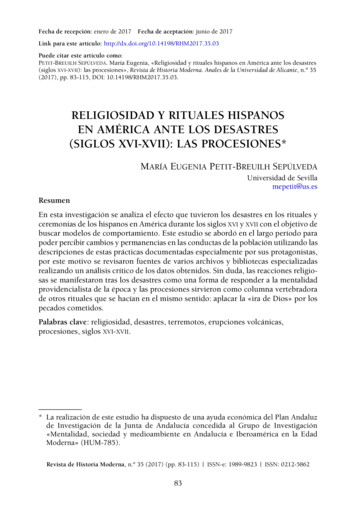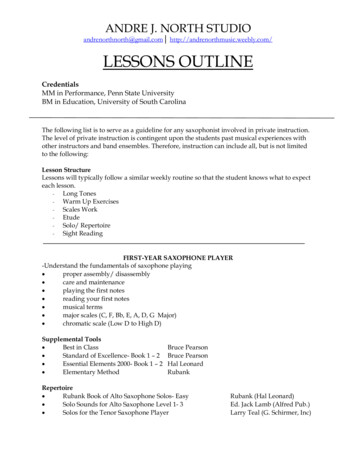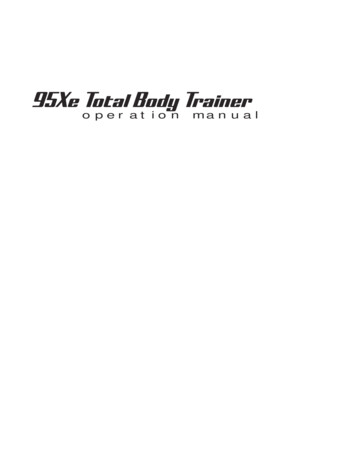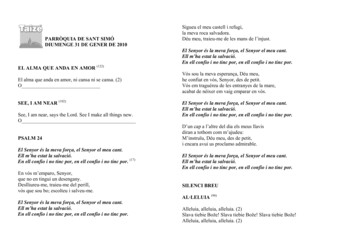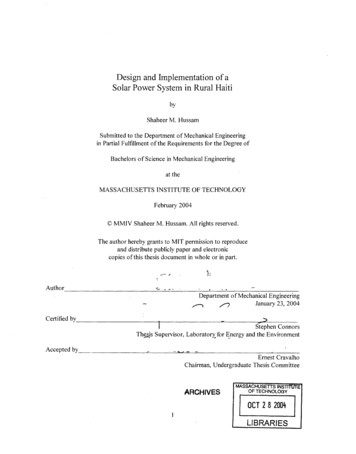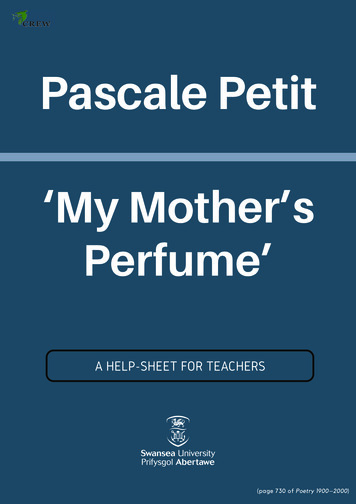
Transcription
Pascale Petit‘My Mother’sPerfume’A HELP-SHEET FOR TEACHERS(page 730 of Poetry 1900–2000)
CONTENTS3SECTION 1 :BIOGRAPHY OF THE POET / CONTEXTS4 SECTION 2 :LINE-BY-LINE COMMENTS ON THE POEM8SECTION 3 :COMMENTS ON THE POEM AS A WHOLE9SECTION 4 :FOUR QUESTIONS STUDENTS MIGHT ASK9SECTION 5 :PHOTOGRAPHS10 SECTION 6 :LINKS TO USEFUL WEB RESOURCES10 SECTION 7 :BIBLIOGRAPHY: FURTHER READINGCYNGOR LLYFRAU CYMRUBOOKS COUNCIL of WALESCYNGOR LLYFRAU CYMRU2
SECTION 1BIOGRAPHY OF THE POET / CONTEXTS(Please note that “context” is not an assessed element of this component of the WJECGCSE in English Literature.)Pascale Petit was born in Paris in 1953 to a French father and a Welsh mother, although she wasbrought up mainly in south Wales. She studied sculpture at the Royal College of Art in London, and itwas not until her mid-40s that she published the first collection of her poetry: Heart of a Deer (1998).This collection contained many features that frequently recur in Petit’s subsequent poems, such ashybrid human/animal characters, as well as her attempts to work through, in poetry, the difficultfamily environment she experienced growing up, particularly her abusive father and her mother’smental illness.Petit’s second collection The Zoo Father (2001) was followed by The Huntress (2005), both continuingher use of the natural world as a source of poetic inspiration and allegory. The Wounded Deer (2005)and What the Water Gave Me (2010) were written in response to the life and art of Frida Kahlo (19071954). Petit’s travels through the Amazonian jungle in Peru and Venezuela provided much materialfor Fauverie (2014) and Mama Amazonica (2017), in which she imagines her mother’s treatment ‘notin the psychiatric ward, but inside pristine primary deep jungle’.1 Petit’s most recent collection TigerGirl (2020) shifts its focus onto her Indian grandmother and draws on the jungles of India to connectpoaching, species extinction and childhood trauma.Among many awards and honours Petit has received for her work, Mama Amazonica won the 2020Laurel Prize, which is for poetry collections that have ‘nature and the environment at their heart’; herpoem ‘Indian Paradise Flycatcher’ won the 2020 Keats-Shelley Prize for Poetry; and in 2018 she wasmade a Fellow of the Royal Society for Literature.2(1) Pascale Petit, ‘Pascale Petit’s Blog’, Blog Spot, n.d, pascalepetit.blogspot.com(2) Simon Armitage, ‘The Laurel Prize 2020 – Winners!’, Simon Armitage The Official Website, eats-Shelley Memorial Association, ‘KEATS-SHELLEY PRIZE 2020’, Keats-Shelley Memorial Association, n.d,keats-shelley.org/prizes/keats shelley prize 2020The Royal Society of Literature, ‘Pascale Petit’, The Royal Society of Literature, n.d,rsliterature.org/fellow/pascale-petitCYNGOR LLYFRAU CYMRUBOOKS COUNCIL of WALESCYNGOR LLYFRAU CYMRU3
SECTION 2LINE-BY-LINE COMMENTS ON THE POEMTitle.The title suggests very strongly that the poem will have a first-person speaker and be about theirfamily. ‘My Mother’s Perfume’ could refer to the smell of the mother herself, when she is present, orthe liquid scent in a bottle, when she is absent. In either case, the importance of the sense of smellto the poem, rather than, for instance, the sense of sight or touch, is foregrounded by the title. Thiscould indicate a physical absence of maternal contact but it is also worth considering the intricateand intimate relationship between the olfactory senses (smell), memory, and emotion.3 Smells enterthe limbic system very quickly, which is the part of the brain that deals with emotional responses.In this way, smells can be the longest lasting of human memories, as well as the most emotive, andPetit utilises this connection throughout the poem to create the emotional power of the speaker’srecollections and thoughts of their mother.Form.The poem’s form contains internal conflicts despite its very regular appearance on the page. It isone stanza of 28 lines, composed of alternating long lines (between 12 and 19 syllables) and shorterindented lines (between 3 and 9 syllables). Only one of the longer lines (line 3) and four of the shorterlines (lines 8, 20, 26, and 28) are also the end of a sentence (end-stopped). Most of the poem’ssentences run over the line ends (enjambment) which suggests that the form and the content arenot in unison. The poem is free verse. The definition of free verse poetry is a poem that does notfollow any pattern, metre or formal structure. This style of poetry is often closely associated with aconversational tone or characteristics of speech.(3) Colleen Walsh, ‘What the nose knows’, The Harvard Gazette, edCYNGOR LLYFRAU CYMRUBOOKS COUNCIL of WALESCYNGOR LLYFRAU CYMRU4
SECTION 2LINE-BY-LINE COMMENTS ON THE POEMLines 1–3.A personal, possibly intimate, tone is established by the poem opening ‘Strange how’, rather thanthe more grammatically correct ‘It was strange how’. This informality is reinforced by the use of‘I’d’ in line 4, rather than ‘I would’ and is characteristic of the conversational and confessional toneof Petit’s poetry. It certainly is far beyond the realms of probability that the speaker, inside a house,can smell their mother ‘long before’ her taxi arrives outside. Therefore, this indicates that memory,emotion, and imagination are causing an olfactory hallucination. This is supported by the descriptionof the mother’s scent as ‘a jade cloud’, showing it has taken on a visible, green form to the speaker.Jade is a valuable and rare mineral mostly found in South-East Asia; it has no noticeable smell tothe human nose and is not used in the manufacture of perfumes. Therefore, the associations formedby the speaker between their mother and jade must have significances other than scent, whichcould include being exotic and attractive, yet cold and hard. The intense colouring of jade makes itsomething out of the ordinary, and it seems to enter the speaker’s world only for brief moments, likethe mother. The thought of the mother’s imminent arrival makes the speaker visit the ‘loo’, which ismore informal language, possibly reflecting the speaker’s vocabulary as a child. Despite the lack offurther detail here, the fear regarding the mother’s arrival revealed later in the poem suggests thatthis visit to the toilet is to relieve a sudden pressure on bladder or bowel, rather than to wash theirface or brush their teeth.Lines 4–6.The idea that the mother’s return will not result in a warm, natural reunion is further advanced bythe speaker having to ‘prepare’ for it by ‘trying to remember her face, without feeling afraid.’This fear could stem from the effort of trying to recall the mother’s face, or simply from the imageof the face itself and therefore the impending arrival of the mother. Either way, it shows how visualmemory is less powerful to the speaker than olfactory memory. The concerted attempts appear tobe successful as the speaker gets ‘braver’ the ‘nearer’ the mother comes to arriving at the house.Lines 7–9.However, the speaker’s memory of the mother is still linked more strongly with smell than sight asthe efforts at remembering the mother’s face evoke instead ‘her scent’ as the ‘taste’ of ‘coins inthe bottom / of her handbag.’ Like the jade mentioned previously, coins have a value but arecold and hard. That they seem to be loose in her handbag also points to an internal and hiddendisordering as the coins are not carefully kept in a purse where they should be but are possiblysticky and/or dirty from the detritus of the bottom of a handbag. In any case, the coins would havea metallic and unpalatable taste. There is a jump in perspective as the speaker moves from herchildhood recollections to the present day ‘forty years on’ and the idea the mother might appearlingers. The statement that the speaker is only ‘half-expecting’ the mother to arrive indicates sheis estranged or dead.CYNGOR LLYFRAU CYMRUBOOKS COUNCIL of WALESCYNGOR LLYFRAU CYMRU5
SECTION 2LINE-BY-LINE COMMENTS ON THE POEMLines 10-12.The speaker can summon the presence of the mother by smelling the ‘expensive’ perfume she used towear – ‘Shalimar’. Possessing a bottle of this can be seen as an attempt to reconnect with the mother.Although control of the scent is now in the adult speaker’s hands, it still requires ‘daring’ as the smellremains so powerful that ‘only a whiff’ is enough to dredge up their painful childhood memories.Lines 13-15.Shalimar was created by Guerlain in 1925 and is described as an ‘oriental fragrance’.4 This southeast Asian connection provides a link to the jade mentioned in line 2. The ‘vanilla orchid vine’, whichdoes not grow in Wales, further underlines, with alliteration for emphasis, the exotic, therefore distant,nature of the mother’s perfume and, by association, the mother herself. The speaker’s visual memoryis now stimulated by this direct access to the scent and the mother’s ‘ghostly face’ – inferring she isdead – is imagined as if it ‘might shiver like Christ’s face on Veronica’s veil’. This veil was an iconof the Christian church in the Middle Ages and was said to bear an image of Christ after Veronicaused it to wipe the sweat and blood from his face as he carried his cross to the crucifixion. This simileconnects, in the speaker’s mind, the mother with persecution, execution, and resurrection, although‘might’ is an important verb here as it indicates the speaker is thinking of possible, not definite,images. The image of Christ’s face on the veil is also pictured as ‘a green-gold blossom’. Green hasa mix of connotations, ranging from healthy plants to sick people, while gold is a hard and cold formof wealth. These colours also recall the jade cloud and the coins in the mother’s handbag.Lines 16-19.The poem’s narrative does not stay long in the speaker’s present as the scent of the perfumetransports them ‘back to / to the first day of the school holidays’. The speaker discloses how theywould kiss the ‘glass’ to prepare for kissing the mother’s cheek. The ‘glass’ could refer to a windowor be the old-fashioned term for a mirror (like Alice and Through the Looking-Glass5) but in eithercase the same inference can be drawn – that the mother’s cheek is hard and cold, rather than softand warm, subverting conventional expectations of maternal love and care. The only differencewould be that the mirror as a mother-substitute throws a reflection of the speaker back on themselfwhile the window as a mother-substitute allows the speaker to observe the world outside. In addition,glass is brittle and fragile, reflecting the mother’s psychological state.(4) Guerlain Paris, ‘Shalimar’, Guerlain, n.d, shalimar(5) Lewis Carroll, Through the Looking Glass and What Alice Found There (London: Penguin Publishing Ltd, 1994).CYNGOR LLYFRAU CYMRUBOOKS COUNCIL of WALESCYNGOR LLYFRAU CYMRU6
SECTION 2LINE-BY-LINE COMMENTS ON THE POEMLines 20–21.Still in the speaker’s childhood memories, ‘the air turned amber’, as they looked for their mother’staxi. Amber is the orange-coloured resin of trees and is used in Shalimar. This again shows the powerof memory and the imagination to conjure scents at emotional times, as there would not be a realsource of this smell prior to the mother’s arrival. The mother is described as a ‘speck’, as if she weretiny and not human. The time switches rapidly again to the speaker’s present as they say ‘Even now’how the smell of vanilla physically hurts them, expressed in the language of old-fashioned childdiscipline: the ‘cane’. Sight and smell mix in the speaker’s mind to indicate how childhood traumasendure in their adult life.Lines 22–24.The use of ‘But’ shows that the scent of ‘roses and jasmine’ have a counteracting, positive effect onthe speaker compared to the pain caused by the smell of vanilla. These ‘top notes’ from the perfumeare, unlike vanilla and amber, also found in ‘Grandmother’s garden’ as they walk towards the taxiwhen it arrives. Therefore, these scents are not exclusively connected to the mother’s perfume. Theuse of ‘wading’ gives a dream-like impression that the garden is overflowing with roses and jasmine,which are ‘fragrant’, invariably meaning a pleasant smell. This could suggest a hope that this reunionwith their mother might be better. However, the ‘gloved hand’, a barrier that prevents the warmth ofhuman contact, and the taxi being ‘black’, suggest the speaker’s hopes will be dashed once more.Alternatively, this scene could be read as one where the speaker feels safe in her grandmother’sgarden and the mother’s arrival is unwelcome and threatening.Lines 25–28.The tense now changes from past (line 19: ‘scanned’) to present, even though this event is still thespeaker’s childhood memory: ‘And for a / moment I think I am safe.’ This present tense continuesto the end of the poem as ‘Maman turns to me’. The exotic and distant associations that the poemhas created around the mother are emphasised here by the French word for ‘mom’, in contrast withthe grandmother who is named in the English way. This is the moment the speaker realises they arenot ‘safe’ as the look on the mother’s face is enough to show that her mental illness still afflicts her.The role of the perfume as a representation of the mother is reinforced by the simile of her ‘smile’being like ‘a dropped / perfume bottle’. It is difficult to picture exactly how a dropped bottle couldlook like a smile; perhaps the facial responses one might make to such an accident could include agrimace, or the liquid could streak across the floor in a smile-like semi-circle. The overall image isone of an unintended waste of a valuable substance, and this is further underlined by the mother’s‘essence’ being ‘spilt’ by her mental illness.CYNGOR LLYFRAU CYMRUBOOKS COUNCIL of WALESCYNGOR LLYFRAU CYMRU7
SECTION 3COMMENTS ON THE POEM AS A WHOLEAs the title indicates, the sense of smell is central to the poem. However, the reader will not be ableto smell anything from the poem itself, of course, and so the poet’s choice of words, the imagesthey create, and the reader’s own imagination and memories need to perform a certain amount ofinterpretative work for the poem to have impact. Part of the poem’s success is how the other senses,particularly sight and touch, are brought into the equation as, ultimately, all our senses can becombined in memories.The difficulty in establishing boundaries and cordoning off areas is reflected by the poem’s form.Despite its regular appearance at first glance, the sentences overflow beyond the line ends and pastand present are blurred. While the two types of lines could reflect the two viewpoints – the child’sexperiences at the time and the adult’s thoughts when reflecting on the past – the merging of theperspectives and the changing of the tenses show how this trauma lives on in the speaker’s presentand has not been successfully resolved. The regular form appears an attempt by the adult to establishorder over the madness their younger self experienced, in the same way that owning a bottle ofShalimar is an attempt to control those memories. However, these feelings overwhelm the rigid,recurring form, which is incapable of sectioning the poem into neat and self-contained lines. Whilethere is no rhyme and minimal use of metaphor, the poem’s intensity is achieved through vivid andevocative imagery, with a devastatingly powerful simile to end the piece.CYNGOR LLYFRAU CYMRUBOOKS COUNCIL of WALESCYNGOR LLYFRAU CYMRU8
SECTION 4FOUR QUESTIONS STUDENTS MIGHTASK ABOUT THE POEM How simple or complicated is the language that the poem uses? How does the form of the poem on the page play a part in the poem’s meaning? How reliable do you find the speaker’s version of events? What level of sympathy do you have for the speaker and the mother?SECTION 5PHOTOGRAPHSCredit to Pascale Petit(pascalepetit.co.uk).CYNGOR LLYFRAU CYMRUBOOKS COUNCIL of WALESCYNGOR LLYFRAU CYMRU9
SECTION 6(links active June 2021)All links are clickableLINKS TO USEFUL WEB RESOURCESInformation about The Huntress (2005), the collection from which ‘My Mother’s Perfume’ is taken:serenbooks.com/productdisplay/huntressPetit Pascale’s blog: pascalepetit.blogspot.comSECTION 7(links active June 2021)All links are clickableBIBLIOGRAPHY: FURTHER READING‘Pascale Petit’s Workshop’ (Guardian): theguardian.com/books/2006/jun/08/poetry2Petit Pascale’s biography by Poetry 8/Pascale-Petit/en/tileDr Adrian OsbourneCREW, Swansea UniversityJune 2021CYNGOR LLYFRAU CYMRUBOOKS COUNCIL of WALESCYNGOR LLYFRAU CYMRUBOOKS COUNCIL of WALESWe are grateful for the financial support of Swansea University,The Learned Society of Wales, and the Association for WelshWriting in English.CYNGOR LLYFRAU CYMRUBOOKS COUNCIL of WALESCYNGOR LLYFRAU CYMRUBOOKS COUNCIL of WALES
nature of the mother’s perfume and, by association, the mother herself. The speaker’s visual memory is now stimulated by this direct access to the scent and the mother’s ‘ghostly face’ – inferring she is dead – is imagined as if it ‘might shiver like
